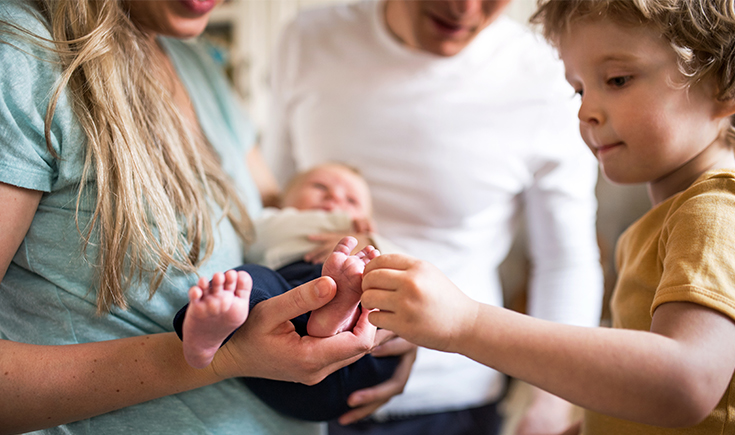

The transition to a second child can bring with it a huge change in the family dynamics. To make the adjustment to the new baby a little smoother, it’s a good idea to start early – even before the baby comes – to help your firstborn anticipate these changes.
When a newborn enters the picture, it can elicit a spectrum of emotions for the whole family.You might feel sadness or even grief for your firstborn that you can’t be as physically or emotionally available for them as you were before.
If you have help with your older child from your partner or family, you might miss them when they’re not with you as much. You will probably feel excitement, but your older child may not feel the same. They sometimes feel resentment, so pay attention to any behaviour changes (which is a normal response and to be expected), and find loving ways to address them.
Your first child’s world will be turned upside down, their routine changes, and you might not be able to do all of the same things with them during late pregnancy and the fourth trimester, such as picking them up, or snuggling with them in bed as much.
Here are some practical ways to help your firstborn adjust to the new baby before and after their arrival
When you welcome your new baby, you might feel more prepared and confident than the first time around. However, everyone has different needs that need to be met, and that’s challenging when you’re recovering from birth, feeding, and you’re sleep-deprived. You still need your rest, and if you have a partner that is taking on the primary care of your firstborn, they might not be as available to support you overnight or with meals, for example. The key is to be prepared.
How to prepare your older child in advance:
- When you’re pregnant, cultivate a relationship with someone who can take your older child to the park for an hour or two, or drop off a meal now and then. Keep a backpack of your child’s essentials and comforting items ready for them, so that when the time comes, they’ll be prepared for any outings. If you don’t have a support network, and your budget allows, you might consider one of the various types of in-home newborn support services.
- Read books together about new babies (find ones that focus on the positives rather than the dissatisfaction that comes with having a new sibling!), and talk about the excitement of them being a big brother or sister, and how important that role is.
- Think about their bedtime routine and sketch it out. Who is going to handle bedtime? Will it be your partner, or someone else? Create a chart with images for your older child, and stick it on the wall so they can see it. Even start the new routine during pregnancy.
- Who is going to do breakfast and any morning routine, such as daycare drop-off? Again, chat about it or create a picture for them to show them what it’s going to be like. Children feel more confident and comforted with predictability.
- Ensure everyone is getting nourishing food often, so hunger isn’t impacting moods or behaviour. Meal plan ahead of time, freeze meals for your child, or enlist the help of family or friends.
- Gift your child a new doll, and show them how to care for them, and how to be gentle with them.
When the baby comes:
- Carve out special time with your older child for even fifteen minutes a day. Connection is a basic human need, so maintain it as much as you can. Talk about and acknowledge the changes, any feelings that come up, chat about their day, or what they’d like to play with you. It could be as simple as reading a book with them (here are some more ideas for filling your baby’s love cup but they also apply to older children).
- Assure your child that they’re not being replaced, and that they’re loved. Give them extra I love yous, lots of hugs, and plenty of verbal and physical reassurance.
- Give your child a ‘yes space’. A room that is safe, child-proof, and full of toys and furniture that you won’t be saying no to.
- Get your child involved in the day-to-day, and give them important jobs such as passing you nappies, or your water bottle when you’re feeding. If your baby receives gifts, ask your child to open them (better yet, ask people to give your child a gift instead of the baby). Here are some activities to keep your toddler busy during newborn feeds.























